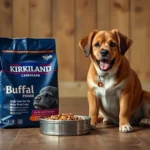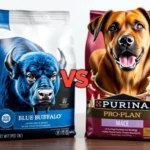
Introduction
Understanding dog nutrition is crucial for every pet owner. Just like humans, dogs require a balanced diet to maintain their health, energy levels, and overall wellness. However, the line between what’s safe for our furry friends and what isn’t can sometimes blur, especially when it comes to human foods. One popular snack food that often comes into question is Cheez Its. With their cheesy flavor and crunchy texture, many dog owners wonder if these treats can be shared with their pets. This article aims to educate pet owners on whether dogs can eat Cheez Its, exploring the nutritional implications and potential risks associated with this popular snack.
Understanding Dog Nutrition
The Basics of Canine Diet
A dog’s diet should be well-rounded and tailored to their specific needs. Essential nutrients for dogs include:
- Proteins: Vital for growth, muscle development, and tissue repair.
- Fats: Provide energy and support cell function; also essential for absorbing fat-soluble vitamins.
- Carbohydrates: Serve as a primary energy source. Dogs can digest carbs, but they should be balanced with proteins and fats.
- Vitamins and Minerals: Necessary for various bodily functions, including immune response and bone health.
A balanced diet should be customized based on a dog’s age, size, and activity level to ensure optimal health.
Common Ingredients in Dog Food
High-quality dog foods typically contain:
- Real meat or meat meal as the primary protein source.
- Whole grains or vegetables as carbohydrates.
- Essential fatty acids from sources like fish oil or flaxseed.
Pet owners should avoid foods containing harmful ingredients such as:
- Artificial preservatives and colors.
- Unspecified meat sources.
- Excessive fillers like corn or soy.
The Role of Treats in a Dog’s Diet
Treats, including snacks like Cheez Its, can be beneficial for training and bonding. However, it’s essential to incorporate them wisely. Guidelines for using treats include:
- Moderation: Treats should not exceed 10% of a dog’s daily caloric intake.
- Nutritional Value: Choose treats that provide health benefits rather than empty calories.
Human Foods: Safe or Not?
Foods Generally Safe for Dogs
Certain human foods can be safe and healthy for dogs, including:
- Fruits: Apples, blueberries, and bananas.
- Vegetables: Carrots, green beans, and sweet potatoes.
- Grains: Brown rice and oats.
Always introduce new foods gradually and in moderation to prevent digestive upset.
Foods That Are Toxic to Dogs
While some human foods are safe, others are dangerous. Common toxic foods include:
- Chocolate: Contains theobromine, which is toxic to dogs.
- Grapes and raisins: Can cause kidney failure.
- Onions and garlic: Can lead to anemia.
If a dog consumes a toxic food, symptoms may include vomiting, diarrhea, lethargy, and in severe cases, seizures. Immediate veterinary attention is crucial.
Analyzing Cheez Its
Ingredients in Cheez Its
Cheez Its are made from a blend of ingredients, including:
- Enriched wheat flour: May pose a problem for dogs with grain allergies.
- Cheddar cheese: While some dogs can tolerate cheese, others may experience lactose intolerance.
- Vegetable oils and salt: High sodium content can be harmful to dogs.
Nutritional Content of Cheez Its
A standard serving of Cheez Its contains:
- Calories: Approximately 150 per 30-piece serving.
- Fats: Around 8 grams, including saturated fats.
- Carbohydrates: Roughly 18 grams.
- Sodium: About 250 milligrams.
This nutritional profile indicates that Cheez Its are calorie-dense and high in sodium, making them a poor choice for regular treats in a dog’s diet.
Potential Risks of Feeding Cheez Its to Dogs
Feeding Cheez Its to dogs comes with several potential risks:
- High Sodium: Excessive sodium can lead to dehydration and sodium ion poisoning.
- Processed Ingredients: The highly processed nature of Cheez Its means they contain additives that may not be suitable for dogs.
- Digestive Issues: Some dogs may experience upset stomachs or diarrhea after consuming processed snacks like Cheez Its.
Long-term health concerns can arise from regularly feeding dogs human snacks that lack nutritional value.
Can Dogs Eat Cheez Its?
Expert Opinions
Veterinary advice regarding human snacks, including Cheez Its, generally leans towards caution. While an occasional piece may not harm a dog, it is essential to remember that snacks should not replace a balanced diet. Moderation is key; treats should never constitute a significant part of a dog’s daily intake.
Case Studies and Anecdotal Evidence
Many dog owners have shared their experiences regarding feeding Cheez Its to their pets. Some dogs may seem to enjoy the snack and tolerate it well, while others may experience digestive issues. This variability highlights that individual dogs can react differently to the same food.
Conclusion on Cheez Its as a Dog Snack
In conclusion, while dogs can eat Cheez Its on rare occasions, they are not a suitable snack choice for regular feeding. The potential risks associated with high sodium and processed ingredients outweigh the enjoyment dogs may derive from them. Pet owners should prioritize healthier snack options.
Alternative Snacks for Dogs
Healthy Homemade Treats
Instead of Cheez Its, consider making nutritious dog treats at home. Here are a couple of recipes:
- Peanut Butter Biscuits:
- Ingredients: 1 cup whole wheat flour, 1/2 cup peanut butter (unsweetened), 1/4 cup water.
-
Instructions: Mix ingredients, roll out, cut into shapes, and bake at 350°F for 20 minutes.
-
Pumpkin Bites:
- Ingredients: 1 cup canned pumpkin, 2 eggs, 2 cups whole wheat flour.
- Instructions: Mix ingredients, form into small balls, and bake at 350°F for 15-20 minutes.
Store-Bought Alternatives
For convenience, there are many dog-friendly snacks available on the market. Look for options that contain:
- Real meat or fish as the first ingredient.
- Whole grains or vegetables.
- No artificial additives or excessive fillers.
Always read labels carefully to ensure the quality of the snacks you choose for your dog.
Conclusion
In summary, understanding the nutritional needs of dogs is vital for their health and wellbeing. While Cheez Its may seem like a fun snack to share, they pose risks due to their high sodium and processed nature. Instead, prioritize a balanced diet with healthy treats, whether homemade or store-bought. When in doubt, consult with a veterinarian for personalized advice regarding your dog’s diet and snack choices.
FAQ Section
Can dogs have cheese?
Yes, many dogs can enjoy cheese in moderation, but be cautious if your dog is lactose intolerant.
What snacks are best for training?
Soft, small treats that are low in calories and high in palatability work best for training.
How often can I give my dog treats?
Treats should not exceed 10% of your dog’s total daily caloric intake.
Are there any snacks that can help with dental health?
Dental chews and treats specifically designed to reduce plaque and tartar can be beneficial for your dog’s dental health.
By following these guidelines, pet owners can ensure their dogs receive a nutritious diet while enjoying the occasional treat responsibly.









